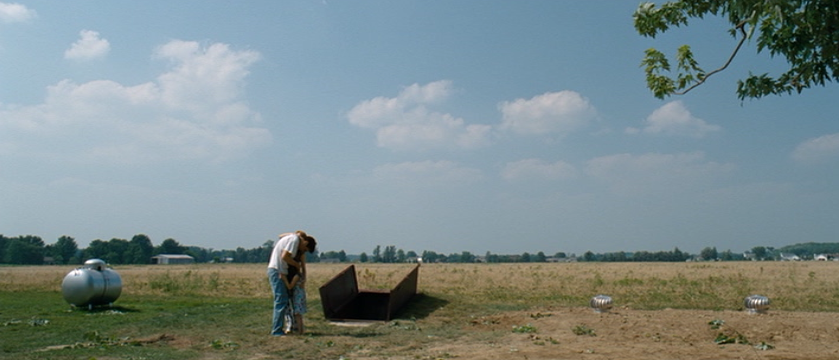Take Shelter, from writer/director Jeff Nichols, is a movie that examines the difficult issue of mental health with tender hands and great care. Nichols is quickly becoming, if not already considered to be, one of the great American story tellers. His partnership with Michael Shannon has spanned over several films and has reaped great rewards. Take Shelter is for me his finest piece of his work to date.
Shannon play Curtis who is, frankly, just a normal man, a blue collar worker with a young family and a dog in the back yard behind the white picket fence. There is in truth nothing special about Curtis, he is the man next door, the work colleague you pass time with amicably, sit in church with. Curtis is an everyman he can be found anywhere in our world.
Something begins to change though as he starts seeing visions: oncoming storms, murmurations of birds and many other fear-burdened moments haunt his day to day life. He hears peals of thunder that no else is privy too. He becomes highly stressed and fearful, even running out on his job, without explanation, in an attempt to escape the thunder.
Curtis becomes obsessed with the notion that a great storm is coming and he needs to protect his family. He begins to work on a pre-existing storm shelter on his property but quickly feels it is unfit for purpose. He frantically tries to make it bigger and stronger; a shelter that will hold his family for a significant period of time.
No amount of preventative measures can seem to reassure him though. His anxiety-laden dreams continue, so much so that he struggles to breath and at one point he has a fit and seizure-like awakening. Part of the film’s intelligence lies in how these dreams are presented to the viewer. Sequences occur at times when the viewer cannot quantify whether what they are watching is real or held within a dreamscape; only to discover the truth when Curtis lurches upright in bed gasping for air. This tool used by Nichols keeps the viewer in suspense and at time edges the film towards a psychological thriller. However, this is much more a film that analyses mental health, its impact and its consequences.
Michael Shannon’s performance in the film is at times breath taking. He portrays Curtis with such wonderful tension, switching from frantic anxiety to faux calm in order to avert questions from his wife (Jessica Chastain).
Shannon is truly one of the great and possibly the most underrated actors working today. I will always gravitate towards any film he features in. In Take Shelter his pain is palpable, his stress feels tangible and his desire to protect those he loves from his struggles is completely relatable and understandable. Ultimately, though, the desire to protect his family may cost him it, as the strains begin to show and family life begins to fracture.
Take Shelter highlights for us that mental health is the great unseen illness. Only Curtis sees the oncoming storm, the flocks of birds; only he knows the pain of his anxieties and only he can choose to talk to his wife, friends, medical practitioners about his fears. The visions he sees and the things he feels are unique to Curtis. No one else in his world experiences it or can understand what is causing him to act in the way he does. The anxieties examined in Take Shelter are a silent, unspoken reality for many people. Curtis is an everyman character but these problems are not unique to him. So many of us struggle with mental health and the different levels of mental health issues are vast and unspoken.
Take Shelter also asks us: who do we trust? Who do we talk to when the overwhelming nature of life overtakes us? How do we deal with our fears, our pressures, our anxieties? Like Curtis we’ve probably all seen the storm on the horizon. Some of us have been able to watch it pass by and remain unaffected. Some have walked through it and some will have been caught up in it’s wrath for what feels like an age.
Wherever you are, wherever you’ve been, you’re not the only one to have had the experience. Find a safe shelter where you can, you’ll be surprised how many of us are in there. Neil Sedgewick
To mark Mental Health Awareness Week and the NI Mental Health Arts & Film Festival we will be running a series of articles on the theme of cinema and mental health. See also Conor Smyth on cinema as a kind of therapy. Neil Sedgewick blogs and podcasts at Films & Faith.





